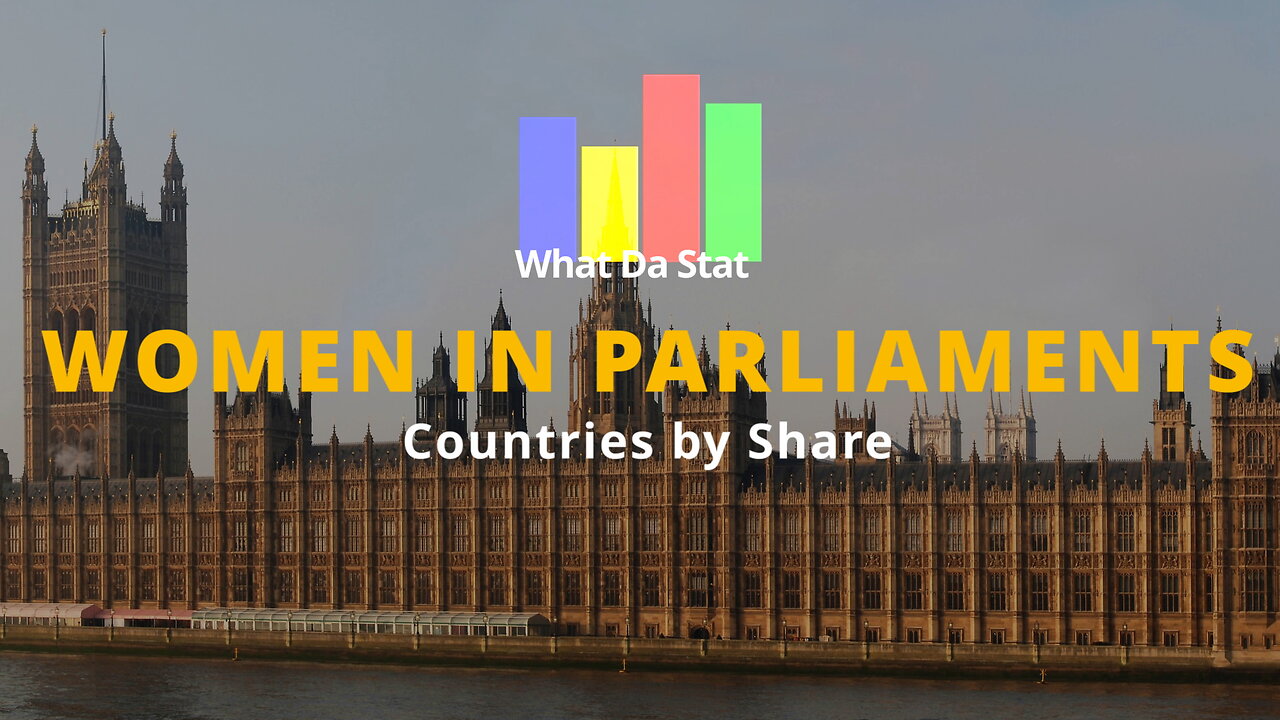Premium Only Content

Share of Women in Parliaments 1900-2022
This video shows the share of women in parliaments by number of countries from 1900 to 2022.
Over the past century, the share of women in parliaments worldwide has witnessed remarkable transformations, reflecting the persistent efforts to promote gender equality and women's representation in political decision-making. Beginning in the early 1900s, the journey towards greater female parliamentary participation has been both arduous and inspiring.
At the dawn of the 20th century, women's political participation was virtually non-existent in most countries. However, the suffrage movement gained momentum in various parts of the world, leading to significant breakthroughs. New Zealand became a trailblazer in 1893 by granting women the right to vote, followed by Australia, Finland, and Norway in the early 1900s. By the end of World War I, several European nations, including the United Kingdom, granted suffrage to some women. This progress opened the doors for women to contest parliamentary elections.
Despite these early stages, progress remained slow, and it wasn't until after World War II that the number of women in parliaments began to rise significantly. The years following the war saw an expansion of women's rights and opportunities, especially in Western democracies. In 1949, Israel's Prime Minister Golda Meir became one of the world's first female heads of government, inspiring countless women to enter politics.
The 1970s marked a turning point as the United Nations declared the International Women's Year, leading to the establishment of the Commission on the Status of Women. This initiative paved the way for gender mainstreaming in global politics and encouraged many countries to implement affirmative action measures to increase female representation in parliaments.
The 1990s and early 2000s saw unprecedented progress, with more countries enacting laws to promote gender equality. The number of female parliamentarians continued to rise, and some nations achieved impressive milestones. Rwanda, for example, emerged as a leader in female representation, with women comprising over half of its parliamentary seats by the mid-2000s.
However, despite the progress made, numerous challenges persisted. Moreover, in many regions, women's political participation remained significantly lower than that of men, creating a substantial gender gap in parliaments.
The global community recognized the importance of addressing these disparities, leading to international commitments like the Beijing Declaration and Platform for Action in 1995. This landmark agreement sought to accelerate women's empowerment and promote equal representation in politics and decision-making roles.
In the 21st century, several countries continued to make strides in promoting women's representation in parliaments. Nordic countries like Sweden, Iceland, and Finland consistently ranked among the highest in female political participation. Additionally, countries like Spain, Germany, and Costa Rica implemented gender quotas and electoral reforms to enhance women's access to political positions.
As the world approached 2020, women constituted approximately 25% of parliamentarians globally, indicating substantial progress compared to the early 1900s. Nevertheless, more needed to be done to achieve gender parity and genuine equality in political representation. Women continued to face challenges such as underrepresentation in leadership positions, limited access to resources, and gender-based violence in politics.
In conclusion, the share of women in parliaments has witnessed a remarkable journey since 1900, reflecting the evolution of gender norms, social movements, and legislative changes worldwide. From gaining the right to vote to occupying high-ranking positions, women have made tremendous strides. However, persistent challenges and disparities remain, calling for sustained efforts to ensure equal representation and opportunities for women in political arenas.
Source: Varieties of Democracy project, Lührmann et al's Regimes of the World classification.
Music:
MaxKoMusic - Building The Future
https://soundcloud.com/maxkomusic/building-the-future-no-copyright-epic-music-cinematic-free-download
Data visualization created with flourish.studio
-
 2:17:27
2:17:27
IcyFPS
5 hours agoA new legend rises.. Icy vs Teardrop | @playoffthegrid | Team MERC Grind |
22.9K2 -
 LIVE
LIVE
TwinGatz
7 hours ago🔴LIVE - Endless Jank | Oblivion Remastered
230 watching -
 1:33:55
1:33:55
Glenn Greenwald
12 hours agoGaza Starves, Pro-Israel Propagandists Escalate Extremist Rhetoric and Actions | System Update #444
144K299 -
 LIVE
LIVE
EnDuEnDo
7 hours ago🚨Variety Stream 🎮 Push to 500 Followers 🚀 Chill Vibes 😎
353 watching -
 11:04:48
11:04:48
GrimmHollywood
15 hours ago🔴LIVE • GRIMM HOLLYWOOD • SHADOW OF THE ERDTREE FIRST PLAYTHROUGH • PART 1
73.5K3 -
 1:40:13
1:40:13
megimu32
9 hours agoON THE SUBJECT: This Timeline is Broken: Epstein, Aliens & Summer Anthems
55.5K19 -
 1:02:42
1:02:42
Donald Trump Jr.
13 hours agoMAHA Means Business, Interview with Calley Means | TRIGGERED Ep.237
157K64 -
 1:53:52
1:53:52
Joker Effect
6 hours agoWhy aren't you trying to enjoy yourself? Live a little! https://go.mother.land/joker
42.1K4 -
 LIVE
LIVE
NeoX5
8 hours agoTyping of the Dead | Don't Be Afraid 2 | Rumble Gaming
160 watching -
 57:50
57:50
BonginoReport
11 hours agoFAKE News In A Downward Ratings Spiral - Nightly Scroll w/ Hayley Caronia (Ep.36)
119K95